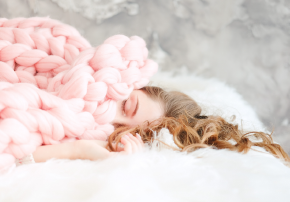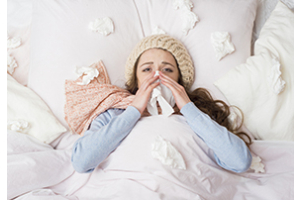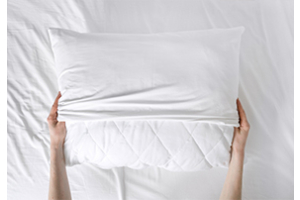How to wake up easier in winter


It’s Cold. It’s Dark. Wakey-Wakey!
It’s winter and time to get up. “Rise and shine” doesn’t quite have the same motivation. And it’s so toasty under the duvet on a cold, dark morning. Let’s just snooze a little longer for 10 minutes. Maybe 15 minutes? An extra half hour? Actually, if it’s your usual morning wake-up time, you need to get out of bed. This isn’t boot camp, but you need to be disciplined about your sleep health, whatever the weather.
South African winters can have their really nippy spells. Up north it’s dry and frosty. Down south is blustery. On the whole, though, we enjoy fairly mild winters. Still, it’s all relative. Some of us feel the chill more than others. But here’s why sticking to your usual wake-up time is perhaps more important than the temperature outside.
Wake up easier in winter.
Sleep scientist, Dr Dale Rae, shares some practical approaches to managing those potentially sluggish winter mornings.
“It’s really about routine,” says Dr Rae, “and keeping to that routine while adapting to the changes in season. Sunrise times will change, but our bodies still maintain a regular, in-built rhythm that tends to sleep and wake around the same hour each evening and morning.”
Still, extreme weather can be a little confronting. Dr Rae shares a few tips to help with adjusting to waking up on a cold winter morning. We’ll go into more detail about how to winter-proof your bedroom, stick to your usual sleep routine and keep a watchful eye over your daily habits and behaviours (ultimately your sleep hygiene).
Winter-proof your bedroom
“Three factors likely impact our sleep the most during winter,” says Dr Rae. “Light, and temperature and air humidity.” Our normal, physiological reaction to cold, dark mornings can be overcome by trying these suggestions from Dr Rae.
Light: “There are a few things we can do to adapt the bedroom environment to make it winter-friendly. As soon as you wake up, turn on a soft bedside lamp. This helps with switching your brain to daytime mode.”
Temperature: “Perhaps set an automatically timed heater to turn on around an hour before your usual wake-up time. That way you can take the edge of the air temperature in the room. It’ll be less bracing to hop out of bed. Alternatively, simply have a warm gown and slippers at your bedside. The purpose is to get up and get going, rather than clinging to your duvet.”
"You can also set an electric blanket, heater, or underfloor heating, to warm up the bedroom just before bedtime. But take care not to overheat the room. If you have winter pyjamas and warm, comfy bedding, this should be adequate to allow your own body temperature to self-regulate. Preferably do not leave an electric blanket on all night. Again, you want your own body temperature to aid in sustaining optimal, quality rest through the nightly sleep cycles."
Air humidity: “If you live further north through cold, dry winters, you may want to consider getting a humidifier for your bedroom. Dry air can sometimes affect sinuses and deep breathing during sleep.”
Natural levels of mucous and moisture that our respiratory system needs may begin to over-compensate for the lack of humidity in the air. Sinuses and airways can become clogged or aggravated. Before you immediately start reaching for nose sprays and assume that you're in the first stages of flu, try a more environmentally natural technique of keeping your bedroom air more humid during colder months.
Keep to your usual sleep schedule.
“It’s only natural,” Dr Rae points out, “that we feel the onset of drowsiness sometime after sunset. Daylight fades considerably earlier in winter. This may throw off our natural body clocks and we may even start to sleep a little earlier.” Besides, the cosiest place on a winter’s evening is in bed, right?
Although it is natural for our body clock to shift slightly with different seasons, take care not to retire too early. The flip side of that is that we may struggle to fall asleep because our bodies may not be quite ready for sleep, or we may start waking up earlier than we intend. And that’s when a snoozing habit can easily kick in. We linger just that little bit longer, and longer still, tucked snugly under the covers. Instead, stick to a consistent sleeping and waking hour. Preferably one that is as close to your usual schedule.
Watch your day-and-night sleep hygiene.
Bottomless hot coffee. Steaming mugs of hot chocolate. Throw in a few donuts and muffins. Enjoy a creamy soup or a freshly baked pie for lunch. Winters can often have us reaching for those warming, comfort foods. And why not? But moderation is always best.
Dr Rae explains. “During winter months, we can be inclined to consume more calories. Our bodies need more energy to keep warm. And that’s perfectly okay, except if we tend to over indulge, especially taking heavier meals ahead of bedtime.”
The seasons come and go, but our bodies still need a regular, healthy approach to eating habits during the day, and especially before bedtime. This includes getting regular exercise and ensuring we stay hydrated. Be careful not to exercise too vigorously too close to bedtime, however. Finally, be mindful to have some downtime after work and before bed. This is especially important for your mental health, too.
There’s no need to be too harsh on yourself. But do put your sleep health first. As with most days, the easier we sleep and wake up, the better we fare.
Shop under the covers at Dial•a•Bed.
If you think about it, shopping for a new mattress is probably best started from your own bed. Sneak in a cosy weekend winter morning to window shop at www.dialabed.co.za. Just don’t lie in too long before you head off to your nearest store and do a comparative Sleep Station Test. You may be surprised just how much more comfort and support you could be enjoying. Go easy on your sleep this winter. #SleepForLife.
TAKE CARE: Lifestyle recommendation is not medical advice. Always consult your healthcare professional should you be experiencing prolonged sleep difficulties or related health issues.





